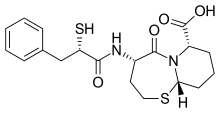Omapatrilat
Omapatrilat (INN,[1] proposed trade name Vanlev) is an experimental antihypertensive agent that was never marketed.[2] It inhibits both neprilysin (neutral endopeptidase, NEP) and angiotensin-converting enzyme (ACE). NEP inhibition results in elevated natriuretic peptide levels, promoting natriuresis, diuresis, vasodilation, and reductions in preload and ventricular remodeling.
 | |
| Clinical data | |
|---|---|
| Other names | BMS-186716 |
| ATC code |
|
| Legal status | |
| Legal status |
|
| Identifiers | |
IUPAC name
| |
| CAS Number | |
| PubChem CID | |
| ChemSpider | |
| UNII | |
| KEGG | |
| ChEMBL | |
| CompTox Dashboard (EPA) | |
| Chemical and physical data | |
| Formula | C19H24N2O4S2 |
| Molar mass | 408.534 g/mol g·mol−1 |
| 3D model (JSmol) | |
SMILES
| |
InChI
| |
| | |
It was discovered and developed by Bristol-Myers Squibb but failed in clinical trials as a potential treatment for congestive heart failure due to safety concerns about its causing angioedema.[3]
Omapatrilat angioedema was attributed to its dual mechanism of action, inhibiting both angiotensin-converting enzyme (ACE), and neprilysin (neutral endopeptidase), both of these enzymes are responsible for the metabolism of bradykinin which causes vasodilation, angioedema, and airway obstruction.
See also
References
- "International Nonproprietary Names for Pharmaceutical Substances (INN). Recommended International Nonproprietary Names (Rec. INN): List 40" (PDF). World Health Organization. p. 190. Retrieved 2 March 2017.
- "Omapatrilat". Adis Insight.
- Venugopal, J (2 March 2005). "Pharmacological Modulation of the Natriuretic Peptide System". Expert Opinion on Therapeutic Patents. 13 (9): 1389–1409. doi:10.1517/13543776.13.9.1389.
Further reading
- Liao, WC; Vesterqvist, O; Delaney, C; Jemal, M; Ferreira, I; Ford, N; Swanson, B; Uderman, H (October 2003). "Pharmacokinetics and Pharmacodynamics of the Vasopeptidase Inhibitor, Omapatrilat in Healthy Subjects". British Journal of Clinical Pharmacology. 56 (4): 395–406. doi:10.1046/j.1365-2125.2003.01888.x. PMC 1884361. PMID 12968984.